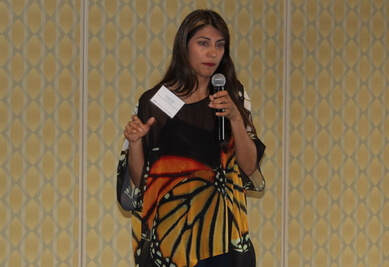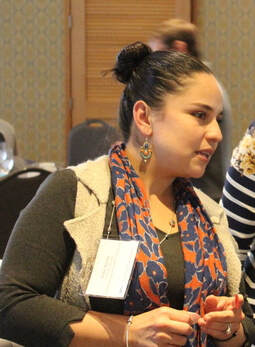OCEAN Spotlight: Enhancing Dual-Language Curriculum
|
A research project between the UCI School of Education and the El Sol Science & Arts Academy is generating findings that could impact K12 schools across the nation.
Working together as part of the School of Education’s OCEAN network, El Sol asked School of Education researchers to obtain a general sense of how its dual-immersion curriculum is received by parents, how it could be improved, and if the 19-year-old charter school is achieving its goals and fulfilling its mission. Researchers collected data through surveys, classroom observations, and teacher and parent interviews, and found a series of answers addressing El Sol’s questions. Chief among them: bilingual students choose to speak a language in a given circumstance partly based on comfort, not just proficiency. |
“It dispels this myth of ‘If you’re not speaking a certain language, it must be because you’re not proficient or you’re not learning the language,’” said Yenda Prado, School of Education doctoral candidate. Prado worked with El Sol as part of OCEAN in the 2018-19 academic school year, along with School of Education Professor Elizabeth Peña.
“There is a lot of new research showing the cognitive benefits of both learning and using two or more languages,” Peña said. “We know it staves off Alzheimer’s Disease in the aging population, for example. If we can start to cultivate bilingualism at younger ages, and people can continue through life using two languages, it can have a huge lifelong effect.”
UCI researchers are now shifting their focus to how to make students more comfortable speaking both languages. They’re looking at how to achieve this at El Sol, in their home, and in the community.
“Forty percent of the children in Orange County speak languages other than English in the home,” Peña said. “We need to start promoting the use of whatever home language kids walk in the door with, and raise recognition that it will have a positive impact on their educational outcomes - I don’t think that message is always communicated.”
El Sol uses English and Spanish in content instruction for all students. Specifically, it follows a 90/10 dual language acquisition model, which means kindergarten students are taught 90 percent in Spanish, with an increasing amount of instruction in English each year until students are taught half in English and half in Spanish in grades 4-8. A diverse population, students come from English-only, Spanish-only, and bilingual families.
“There is a lot of new research showing the cognitive benefits of both learning and using two or more languages,” Peña said. “We know it staves off Alzheimer’s Disease in the aging population, for example. If we can start to cultivate bilingualism at younger ages, and people can continue through life using two languages, it can have a huge lifelong effect.”
UCI researchers are now shifting their focus to how to make students more comfortable speaking both languages. They’re looking at how to achieve this at El Sol, in their home, and in the community.
“Forty percent of the children in Orange County speak languages other than English in the home,” Peña said. “We need to start promoting the use of whatever home language kids walk in the door with, and raise recognition that it will have a positive impact on their educational outcomes - I don’t think that message is always communicated.”
El Sol uses English and Spanish in content instruction for all students. Specifically, it follows a 90/10 dual language acquisition model, which means kindergarten students are taught 90 percent in Spanish, with an increasing amount of instruction in English each year until students are taught half in English and half in Spanish in grades 4-8. A diverse population, students come from English-only, Spanish-only, and bilingual families.
|
"El Sol has always considered the whole child experience from an asset-based perspective,” said Monique Daviss, executive director of El Sol. “Capitalizing on student and family language strengths is an important foundation of our work. Partnering with UCI on this project introduces a way for UCI researchers and El Sol educators to investigate specific ideas that we are curious about and receive valuable feedback that El Sol and others can use to strengthen their practice."
“We’re now exploring what families can do at home to continue to support language acquisition,” said Jenny Zavala, director of curriculum and instruction at El Sol. “We can’t expect an English-only parent to pick up a Spanish book and be fluent, or vice versa, but we can examine how to create deeper interaction between parents and students, and how to build a community that links families to additional resources, including other families.” The research and best practices now being developed at El Sol can be shared with other schools in Orange County. “There’s a lot of chatter about dual-language education, and we’ve been doing it long enough to know the ups and downs,” Zavala said. “I’m curious to know what we can do to help other sites that are now developing their programming, and how we can learn from others coming at it with a fresh perspective.” |
Enter the OCEAN network.
El Sol is one of 10 schools in the School of Education’s Orange County Educational Advancement Network (OCEAN). Established in fall 2018, OCEAN is a network of research practice partnerships (RPPs) between K12 schools and the School of Education. In each RPP, a School of Education faculty and doctoral student are matched with a local school. The entire team of K12 educators, leaders, and researchers develop a research project that addresses key goals and needs of the local school community.
The K12 schools also meet with one another to identify and address their common, complex problems. K12 schools, alongside the School of Education, can then mobilize to implement a measured, trackable improvement plan that identifies and disseminates effective practices to affect multiple schools simultaneously.
El Sol is one of 10 schools in the School of Education’s Orange County Educational Advancement Network (OCEAN). Established in fall 2018, OCEAN is a network of research practice partnerships (RPPs) between K12 schools and the School of Education. In each RPP, a School of Education faculty and doctoral student are matched with a local school. The entire team of K12 educators, leaders, and researchers develop a research project that addresses key goals and needs of the local school community.
The K12 schools also meet with one another to identify and address their common, complex problems. K12 schools, alongside the School of Education, can then mobilize to implement a measured, trackable improvement plan that identifies and disseminates effective practices to affect multiple schools simultaneously.
 A group of doctoral students work with Associate Professor June Ahn at an OCEAN networking event.
A group of doctoral students work with Associate Professor June Ahn at an OCEAN networking event.
“OCEAN is creating a national model for how to advance the science of education into the community,” said Richard Arum, dean and professor of the UCI School of Education. “In just 18 months, these partnerships produced research that is changing the way schools think about their curriculum, instruction, and students. Soon we will be at a point where schools, districts and counties can implement targeted, measured, and systemic changes.”
Arum wants to grow OCEAN to 18 schools by fall 2021. With additional external support, the network can host more school sites, additional research can be conducted, and greater synergies between K12 schools can form.
“This partnership is about being able to share best practices and amplifying model schools and practices so that other schools and organizations interested in implementing different models
can do so in an efficient, effective way,” said Prado, who will be presenting her findings at the American Educational Research Association’s (AERA) annual meeting in April. “I hope my research will be used to start conversations; OCEAN is in an extraordinary position to have an impact in Orange County, California, and the United States – (given that) there aren’t many of these networks around.”
---
Other partnerships in OCEAN include Katella High School, Marco Forster Middle School/Breakthrough San Juan Capistrano, Samueli Academy, TLC Public Charter School, Unity Middle School, Valley High School/High School Inc., Willard Intermediate School.
For more information on OCEAN, please click here.
Arum wants to grow OCEAN to 18 schools by fall 2021. With additional external support, the network can host more school sites, additional research can be conducted, and greater synergies between K12 schools can form.
“This partnership is about being able to share best practices and amplifying model schools and practices so that other schools and organizations interested in implementing different models
can do so in an efficient, effective way,” said Prado, who will be presenting her findings at the American Educational Research Association’s (AERA) annual meeting in April. “I hope my research will be used to start conversations; OCEAN is in an extraordinary position to have an impact in Orange County, California, and the United States – (given that) there aren’t many of these networks around.”
---
Other partnerships in OCEAN include Katella High School, Marco Forster Middle School/Breakthrough San Juan Capistrano, Samueli Academy, TLC Public Charter School, Unity Middle School, Valley High School/High School Inc., Willard Intermediate School.
For more information on OCEAN, please click here.



